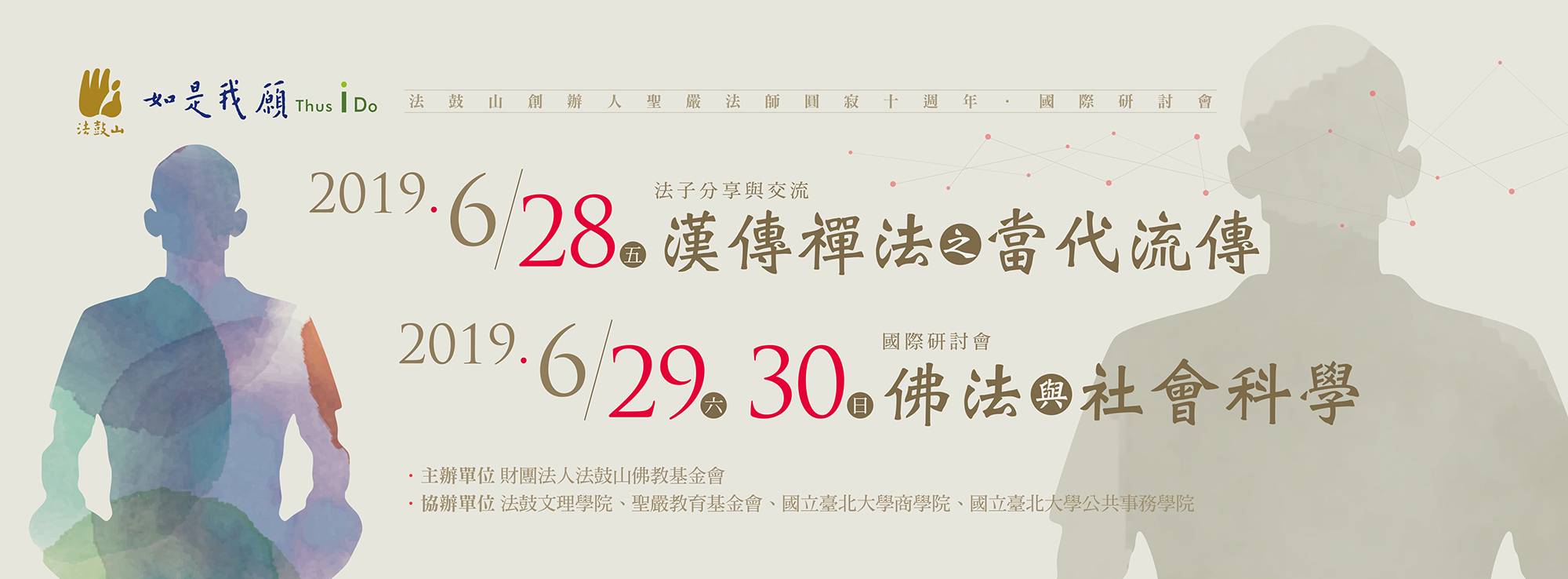人間性、場域性與解構性:
聖嚴法師論如何建設現代社會為人間淨土
王宣曆
聖嚴法師提倡建設人間淨土,除了攝化人群以成熟眾生、提昇人品之人間性,更點出佛法以現代社會為實踐場域之場域性;而聖嚴法師以「心靈環保」心法所開展之人間淨土建設方法,則帶有對治煩惱、解構汙染,以「淨化人心,關懷社會」來重構清淨場域之解構性。
本文首先就聖嚴法師人間佛教理念,論述其推動漢傳佛教之現代轉型,主張正信的佛教「不是世俗化,但是人間化」,回歸佛陀「成熟眾生,莊嚴淨土」之本懷,走向人間(人群、世俗社會),攝化人類,在現代世俗化社會中發揮佛法化俗、導俗之功能。
其次,本文將指出聖嚴法師建設人間淨土乃以現代社會(尤其是歷經工業化、都市化之資本主義社會)為其實踐場域,分析聖嚴法師面對現代化所開展的現代社會場域結構,觀察現代人於此結構中受苦、煩惱之因由,提出以「心靈環保」為核心之人間淨土實踐,以解構內境與外境之煩惱與染污,轉化、重構現代社會為人間淨土,使現代人自在解脫。
最後,本文結論將指出,聖嚴法師「建設人間淨土」之人間佛教理念,以其人間性、場域性與解構性,已由漢傳佛教之現代化追求,邁向後現代性之解構與重構。
關鍵字:聖嚴法師、建設人間淨土、解構
Human Domain, Practice Field and Deconstruction:
Master Sheng Yen on How to Build a Pure Land in Modern Society
Hsuan-Li Wang
Master Sheng Yen had devoted himself to promoting the ideal of “building a pure land on earth”. The ideal emphasizes that “human domain” is the key concern of Buddhist soteriological enterprise, and that our modern society is the main field of Buddhist practices. Moreover, as the method of building a pure land on earth, “spiritual environmentalism” implies the deconstruction of polluted fields to rebuild pure fields through spiritual purification with loving kindness for our society.
The essay will firstly argue that the humanistic Buddhist ideals of Master Sheng Yen are aimed at the modern transformation of Chinese Buddhism which is not to secularize Buddhism, but to reorient it towards the “human domain”, holding true to the original intents of Buddha, so that Buddhism could continue its soteriological enterprise in our secular modern society.
Secondly, the essay will suggest that the ideal of “building a pure land on earth” is to be realized in modern society (especially industrialized and urbanized capitalist society), taking it as the main field of humanistic Buddhist practices. Facing the social field structures developed by modernization, Master Sheng Yen observes and analyzes the causes of suffering in modern lives, and provides “spiritual environmentalism” as a solution. The essay will then investigate into how “spiritual environmentalism” deconstructs the polluted fields to rebuild our modern society into a pure land on earth.
In conclusion, the essay will point out that because of its emphasizing the “human domain” and the deconstruction of social fields, the ideal of “building a pure land on earth” has left the pursuit of the modernization of Chinese Buddhism behind and entered the contexts of post-modern Buddhist practices.
